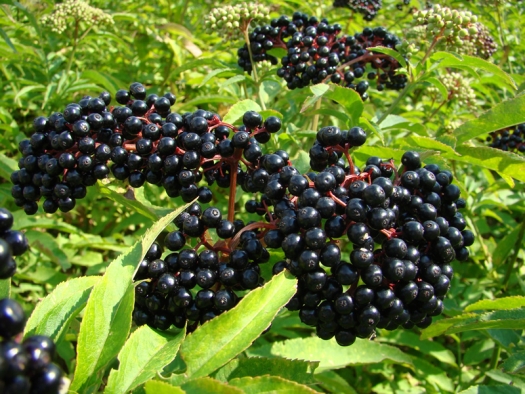ElderberrySambucusBerries.jpg

Photo by Edal Anton Lefterov, ©2007 / CC BY-SA 3.0
Elderberry (Sambucus) berries. Elderberry extract has proven antimicrobial properties against the influenza virus and multiple bacteria.
This article is for educational purposes and does not substitute for medical advice. It is not intended to prevent, diagnose, or treat any disease. If you have any concerns about the severity of your illness, it is important to see a doctor. The purpose of this article is to arm you with things that you can do for yourself at home to minimize discomfort and speed recovery.
The most important thing to do when you get the flu is to go to bed! Call in sick to work for at least a couple of days and preferably a week. You body recovers best when it is at rest.
The second most important thing to do is to stay hydrated. Drink water, diluted fruit juices, vegetable juices, herbal teas, and homemade broths. Coconut water is one of the most hydrating drinks with a full complement of the electrolytes that your body needs.
Eat only as much as your body tells you to and keep the food light. Avoid sugar, dairy, and fried foods. It is best to eat simple foods like applesauce, soups, and porridges. Adding garlic and ginger are an excellent way to support your body's defenses at this time.
When you go to bed at night, try wet sock therapy. This is a Naturopathic therapy that has been used for centuries to support the immune system. It helps stimulate blood and lymphatic flow so that your white blood cells can do the important work they need to do to get you better. You can read a full description of how to do wet sock therapy on the Food and Planet blog.
Stop taking your usual dietary supplements! Whereas iron and zinc are important to support long-term immunity, they may impair the body's resistance to acute infection.1 Fish oils have shown similar effects.2 It is safest to just stop your usual pills and only take what is beneficial during acute infection.
Consider taking homeopathic or nutritional supplements. If you are on any medications or being treated for a chronic disease, please consult your pharmacist or doctor for interactions. To minimize the impact of flu-like symptoms:
- Start with Elderberry. Elderberry extract has proven antimicrobial properties not only against the influenza virus, but also against multiple bacteria.3 Because super-infection with bacteria that cause pneumonia can be a serious complication of the flu, this is a very important therapy. Elderberry is available in several forms, but most commonly in syrup form. Because of the strong scientific evidence of this herbal medicine, I strongly recommend its use for the flu.
- Add Echinacea. While there has been controversy over the efficacy of Echinacea, much of the confusion stems from improper use of the plant. Echinacea can be used either for chronic immune support or to help fight an acute infection. To fight an infection, it is the root that should be used because it is higher in compounds called alkylamides.4 Ethanol extractions are also superior to water extractions to optimize the active compounds. Look for a high quality Echinacea product made from the roots if you come down with the flu. This combines well with Elderberry for a powerful immune punch.
- Consider Oscillococcinum®. Oscillococcinum® is the brand name for a homeopathic remedy that is also known as Anas barbariae hepatitis and cordis extractum 200C. Homeopathy works on the principles of "like cures like" and the "minimal dose." This remedy is an extreme dilution of duck heart and liver, which homeopaths believe to be reservoirs of the influenza virus. It is recommended to start taking this remedy at the earliest onset of flu-like symptoms. A review of the research concludes that while Oscillococcinum® is not effective at preventing the flu, it may reduce the duration of illness.5 Because of its extreme dilution, this remedy is very safe. I file this remedy under the category of "it won't hurt and it just might help."
Rest up and feel better soon!
References
1. Kehl-Fie TE, Skaar EP. Nutritional immunity beyond iron: a role for manganese and zinc. Current Opinion in Chemical Biology. 2010;14 (2):218-224.
2. Schwerbrock NMJ, Karlsson EA, Shi Q, Sheridan PA, Beck MA. Fish Oil-Fed Mice Have Impaired Resistance to Influenza Infection. Journal of Nutrition. 2009;139 (8):1588-1594.
3. Krawitz C, Mraheil M, Stein M et al. Inhibitory activity of a standardized elderberry liquid extract against clinically-relevant human respiratory bacterial pathogens and influenza A and B viruses. BMC Complement Altern Med. 2011;11 (1):16.
4. Marshall K. A Research Review on the Short and Long-term use of Echinacea. Gaia Herbs Research Update. 2010
5. Vickers AJ, Smith C. Homoeopathic Oscillococcinum for preventing and treating influenza and influenza-like syndromes. Cochrane Database Syst Rev. 2000(2):CD001957.


